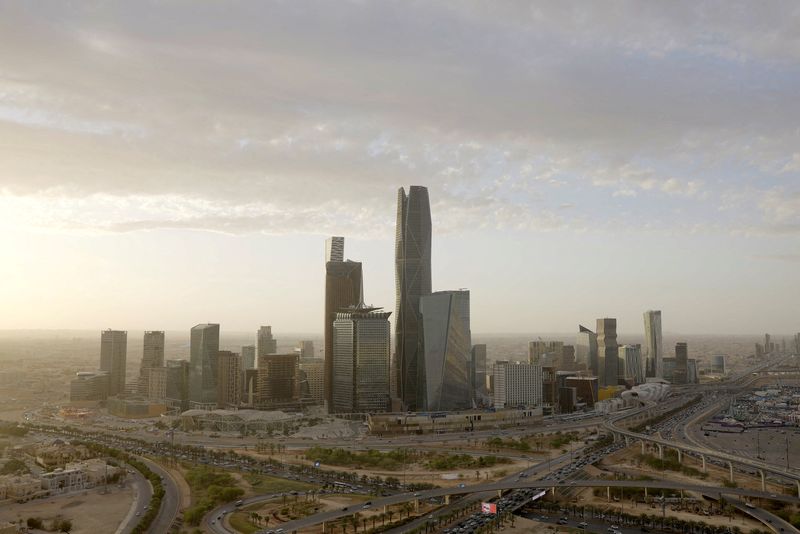By Anant Chandak
BENGALURU (Reuters) - Saudi Arabia's economic growth will likely be one of the slowest among the Gulf Cooperation Council (GCC) countries this year, according to a Reuters poll of economists who lowered growth forecasts from three months ago due to extended oil output cuts.
The Organization of the Petroleum Exporting Countries and allies led by Russia, known as OPEC+, were expected to start raising production this year but in June said the reductions would continue well into 2025.
Despite the war in the Middle East, oil prices have struggled to stay above $80 per barrel, prompting the International Monetary Fund (IMF) to cut this year's growth forecast for Saudi Arabia, the largest economy in the region.
The latest Reuters poll of 24 economists taken July 8-22 showed Saudi Arabia's economy would expand 1.3% this year, down from 1.9% forecast in an April survey and substantially lower than the 3.0% predicted in January.
"Lower oil revenues are impacting non-oil growth. Saudi Arabia is in the process of an overhaul of Vision 2030 and adjusting investment spending...The impact on real GDP growth is clear – less investment means a more moderate growth outlook," said Ralf Wiegert, director of MENA economics at S&P Global Market Intelligence.
Economists said lower oil revenues were likely to constrain investments in non-oil sectors, affecting the overall expansion in 2024.
But the Saudi growth forecast for 2025 was upped to 4.5% from 4.1%in April.
"Expected growth has been increased for 2025...The reason for that is a change in expected oil production, which we think will be increased earlier than previously projected – though not back to the level that prevailed until July 2023," added Wiegert.
The United Arab Emirates (UAE), also focused on diversifying its economy, was expected to expand faster than its neighbour this year - 3.7% - as it soon ramps up oil production and continues to focus on tourism, followed by 4.2% growth in 2025.
"The UAE will be able to raise oil output sooner than other OPEC+ members and, coupled with supportive fiscal policy, it is likely to hold onto its position as the fastest-growing economy in the Gulf both this year and next," noted James Swanston, Middle East and North Africa economist at Capital Economics.
"In the rest of the Gulf, after the OPEC+ decision to keep oil output lower for longer, economic growth in Kuwait, Oman, and Bahrain will be weaker this year than we had previously pencilled in."
While Kuwait was expected to remain in a recession this year, Qatar, Oman and Bahrain were seen expanding 2.2%, 1.6% and 2.6%, respectively. Overall growth in the region was seen averaging 1.9% in 2024.
However, inflation was expected to stay subdued with median forecasts ranging between 1.0% and 3.0% in 2024, including the lowest in Oman and the highest in Kuwait. In Saudi Arabia, it was expected to average 2.1% this year.
"Inflation dynamics in the Gulf have been very benign, even at the height of global inflationary pressures," said Francesco Arcangeli, emerging market economist at J.P. Morgan.

"We overall see inflation behaving well. For Saudi Arabia, the main source of recent pressure has been related to rent prices...Upside risks could be related to the large ongoing spending, but on the other hand these appear to be mitigated by a supportive labour market."
(Other stories from the Reuters global economic poll)